NEWS ROUNDUP
One strike delayed, another set ● RAP ribbon cutting ● Scrap the cap
Monday, January 6, 2020
LOCAL
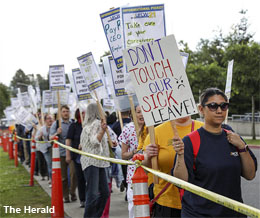 ► In the (Everett) Herald — Health workers postpone Providence-Swedish strike notice — Union-represented Swedish and Providence employees from across the state, including in Everett and Edmonds, have postponed a strike notice after substantial progress was made Thursday night in talks with the health-care organization. Both sides were optimistic about reaching a deal in the next week. The decision to delay was made after Swedish and parent-company Providence negotiators made commitments to address staffing concerns, a union news release said Friday morning. Marathon bargaining is expected over the next seven days, and union representatives say a strike is still possible. “The goal has never been to strike — we want a fair contract,” said Whittney Powers, a registered nurse at Swedish Edmonds. “I think part of why Providence has started to come about and make these commitments is they have seen how passionate our caregivers are and the momentum we have in this movement.”
► In the (Everett) Herald — Health workers postpone Providence-Swedish strike notice — Union-represented Swedish and Providence employees from across the state, including in Everett and Edmonds, have postponed a strike notice after substantial progress was made Thursday night in talks with the health-care organization. Both sides were optimistic about reaching a deal in the next week. The decision to delay was made after Swedish and parent-company Providence negotiators made commitments to address staffing concerns, a union news release said Friday morning. Marathon bargaining is expected over the next seven days, and union representatives say a strike is still possible. “The goal has never been to strike — we want a fair contract,” said Whittney Powers, a registered nurse at Swedish Edmonds. “I think part of why Providence has started to come about and make these commitments is they have seen how passionate our caregivers are and the momentum we have in this movement.”
ALSO from UFCW 21 — Progress in negotiations results in postponement of strike date
PREVIOUSLY at The Stand — 13,000 Providence healthcare workers preparing to strike
► In the Spokesman-Review — Unions delay strike at Sacred Heart, Holy Family as negotiations progress overnight —
 ► In the Columbian — Clark College faculty set strike date — Clark College faculty will strike Jan. 13 if their union and college administrators fail to reach a tentative contract agreement. The Association for Higher Education announced Thursday that if a deal is not struck by 5 p.m. Jan. 10, members will begin striking the following Monday morning. The association is advocating for increased faculty salaries, including more equitable wages between full-time professors and part-time instructors.
► In the Columbian — Clark College faculty set strike date — Clark College faculty will strike Jan. 13 if their union and college administrators fail to reach a tentative contract agreement. The Association for Higher Education announced Thursday that if a deal is not struck by 5 p.m. Jan. 10, members will begin striking the following Monday morning. The association is advocating for increased faculty salaries, including more equitable wages between full-time professors and part-time instructors.
PREVIOUSLY at The Stand — Clark College faculty union votes to authorize strike
► In today’s (Longview) Daily News — Port cautious, but sees US-China deal as step to restore grain exports — Despite China’s promise to buy an average of $40 billion of American farm products annually over the next two years — nearly double pre-trade war numbers — local port officials are cautious and a bit skeptical.
► From NW Labor Press — A union campaign at Columbia Sportswear — When warehouse workers in North Portland started looking at joining the Teamsters, billionaire CEO Tim Boyle came down to the shop floor to try to talk them out of it.
► In the Kitsap Sun — P.S. Naval Shipyard dry docks busy in 2020 and beyond
 ► In the (Everett) Herald — Path to apprenticeships now starts at high school (by Nate Nehring) — In Snohomish County, we are working proactively to increase access to family-wage careers. Over the last two years, we have built a coalition of representatives from labor, industry and education. Community leaders from these sectors have come together to talk about how we can work together to provide meaningful solutions to the problem of a workforce shortage. What began as a group of stakeholders around a table has resulted in the creation of the Regional Apprenticeship Pathways (RAP) Program, which is being hailed as a potential statewide model for workforce development. The RAP Program brings hands-on training in the skilled trades back into the high school.
► In the (Everett) Herald — Path to apprenticeships now starts at high school (by Nate Nehring) — In Snohomish County, we are working proactively to increase access to family-wage careers. Over the last two years, we have built a coalition of representatives from labor, industry and education. Community leaders from these sectors have come together to talk about how we can work together to provide meaningful solutions to the problem of a workforce shortage. What began as a group of stakeholders around a table has resulted in the creation of the Regional Apprenticeship Pathways (RAP) Program, which is being hailed as a potential statewide model for workforce development. The RAP Program brings hands-on training in the skilled trades back into the high school.
From The Stand’s CALENDAR — Regional Apprenticeship Pathways Program Ribbon Cutting event and tour will be held at 9 a.m. Tuesday, Jan. 7 at Marysville-Pilchuck High School, 5611 108th St. NE in Marysville. For details, email Nate.Nehring@snoco.org or call Russell at 425-388-3494.
BOEING
► In today’s NY Times — It’s not just software: New safety risks under scrutiny on Boeing’s 737 MAX — As part of the work to return the MAX to service, the company and regulators have scrutinized every aspect of the jet, uncovering new potential design flaws. The senior Boeing engineer said that finding such problems and fixing them was not unusual and not particular to the MAX or to Boeing.
► From the WSJ — Boeing considers raising debt as MAX crisis takes toll
► From CNBC about 13 months ago — Boeing raises its dividend 20%, boosts buyback plan to $20 billion, reaffirming its bullish outlook
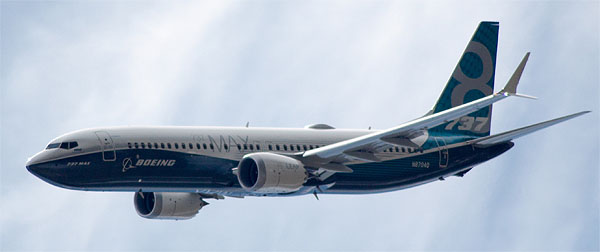 ► From Quartz — The 1997 merger that paved the way for the Boeing 737 Max crisis — In a clash of corporate cultures, where Boeing’s engineers and McDonnell Douglas’s bean-counters went head-to-head, the smaller company won out. The result was a move away from expensive, ground-breaking engineering and toward what some called a more cut-throat culture, devoted to keeping costs down and favoring upgrading older models at the expense of wholesale innovation. Only now, with the 737 indefinitely grounded, are we beginning to see the scale of its effects.
► From Quartz — The 1997 merger that paved the way for the Boeing 737 Max crisis — In a clash of corporate cultures, where Boeing’s engineers and McDonnell Douglas’s bean-counters went head-to-head, the smaller company won out. The result was a move away from expensive, ground-breaking engineering and toward what some called a more cut-throat culture, devoted to keeping costs down and favoring upgrading older models at the expense of wholesale innovation. Only now, with the 737 indefinitely grounded, are we beginning to see the scale of its effects.
► From KING 5 — American Airlines vows to share Boeing compensation with workers — Several other 737 Max customers have recently reached agreements with the manufacturer, but the final agreement has not been publicly released due to the grounding.
THIS WASHINGTON
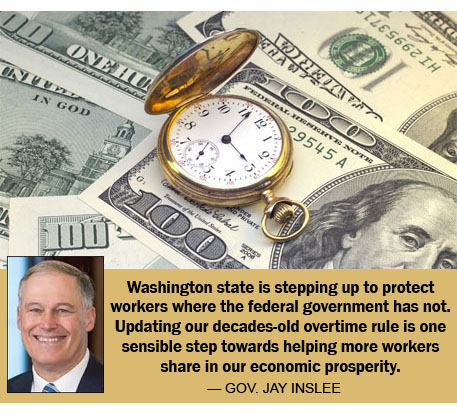 ► In the Seattle Times — New overtime rules will help restore work-life balance for Washington workers (by Joel Sacks) — This decision reinforces the governor’s and L&I’s commitment to keeping Washington a leader when it comes to workers being treated fairly and earning appropriate compensation for the time they spend working. These overtime rule updates are the right thing to do, and they’re long overdue.
► In the Seattle Times — New overtime rules will help restore work-life balance for Washington workers (by Joel Sacks) — This decision reinforces the governor’s and L&I’s commitment to keeping Washington a leader when it comes to workers being treated fairly and earning appropriate compensation for the time they spend working. These overtime rule updates are the right thing to do, and they’re long overdue.
PREVIOUSLY at The Stand — Washington now has ‘strongest overtime law in the nation’
► In the News Tribune — If Washington is a nanny state, so be it. These four new state laws show 2020 foresight (editorial) — Beginning Jan. 1, four new laws (including a minimum wage increase and the new paid family leave program) go into effect across the state that should go a long way toward making life better for many Washingtonians. Critics might call them nanny-state laws. We call them common sense.
PREVIOUSLY at The Stand — New year brings paid family leave, minimum wage increase
► In today’s (Everett) Herald — State timber plan worries the biggest employer in town — Changes in state forest management will put Darrington’s largest employer, the Hampton Mill, at risk. The mill has 175 employees, most of whom live in or near town, and it got word in December that the state Department of Natural Resources will reduce the amount of timber it can buy from state forests over the next decade.
THAT WASHINGTON
► In the Washington Post — Railroads are slashing workers, cheered on by Wall Street to stay profitable amid Trump’s trade war — While the U.S. economy overall is growing moderately, the railroad industry is a cautionary sign of the ongoing pain in the industrial sector and the deep structural changes underway in the economy that are eliminating middle-class jobs. Trump’s trade war has hit agriculture and manufacturing hard, causing lower demand for companies that move freight. But railroad stocks soared in 2019 after rail executives embraced automation and cost-cutting to remain profitable, doubling down on the idea that rail’s future entails longer, faster trains and fewer workers.
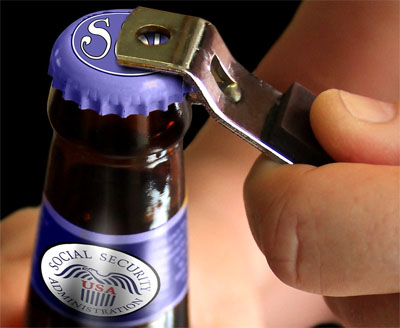 ► In the LA Times — 1,200 Americans have finished paying their 2020 Social Security tax. You’ll be paying all year (by Michael Hiltzik) — More than 1,200 Americans were fully paid up on the year’s Social Security taxes as of last Thursday, the first working day of 2020. That’s because their income is likely to be so high that it took mere hours for them to reach the $137,700 wage cap on the payroll tax in effect for this year… Wage earnings by the top 1% in America have grown further beyond the Social Security tax than policymakers ever expected. As Kathleen Romig of the Center on Budget and Policy Priorities observed in 2016, the cap was last adjusted in 1977 to cover 90% of all earnings, and indexed to inflation. Since then, earnings growth at the top has reduced that ratio to close to 80%. It needs to be readjusted, urgently, because with every year that passes, wealthy taxpayers pay less of their fair share.
► In the LA Times — 1,200 Americans have finished paying their 2020 Social Security tax. You’ll be paying all year (by Michael Hiltzik) — More than 1,200 Americans were fully paid up on the year’s Social Security taxes as of last Thursday, the first working day of 2020. That’s because their income is likely to be so high that it took mere hours for them to reach the $137,700 wage cap on the payroll tax in effect for this year… Wage earnings by the top 1% in America have grown further beyond the Social Security tax than policymakers ever expected. As Kathleen Romig of the Center on Budget and Policy Priorities observed in 2016, the cap was last adjusted in 1977 to cover 90% of all earnings, and indexed to inflation. Since then, earnings growth at the top has reduced that ratio to close to 80%. It needs to be readjusted, urgently, because with every year that passes, wealthy taxpayers pay less of their fair share.
► From Bloomberg — More labor law charges possible under NLRB union election rule — Union elections could see more allegations of unlawful employer conduct as a result of the National Labor Relations Board’s recently issued rule to extend the union election process. The longer the election process goes on, the more opportunity there will be for unlawful activity, some observers said.
PREVIOUSLY at The Stand — Politicized NLRB failing to protect America’s working people
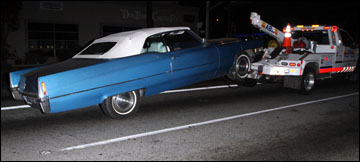 ► From the NW Labor Press — Congress repeals ‘Cadillac’ tax — Two features of Obamacare that were opposed by organized labor were eliminated in a bill President Donald Trump signed into law Dec. 20. One was the Affordable Care Act’s so-called “Cadillac tax” — a 40% excise tax on employer-sponsored insurance premiums that exceed $10,200 for individual and $27,500 for family coverage. That would have led to benefit cuts for union-negotiated plans in some industries and parts of the country. The tax was originally supposed to begin in 2018, but Congress repeatedly stepped in to delay it; it was most recently set to take effect in 2022. The other was an annual fee on health insurers, which raised the cost of many union-negotiated health insurance benefits.
► From the NW Labor Press — Congress repeals ‘Cadillac’ tax — Two features of Obamacare that were opposed by organized labor were eliminated in a bill President Donald Trump signed into law Dec. 20. One was the Affordable Care Act’s so-called “Cadillac tax” — a 40% excise tax on employer-sponsored insurance premiums that exceed $10,200 for individual and $27,500 for family coverage. That would have led to benefit cuts for union-negotiated plans in some industries and parts of the country. The tax was originally supposed to begin in 2018, but Congress repeatedly stepped in to delay it; it was most recently set to take effect in 2022. The other was an annual fee on health insurers, which raised the cost of many union-negotiated health insurance benefits.
NATIONAL
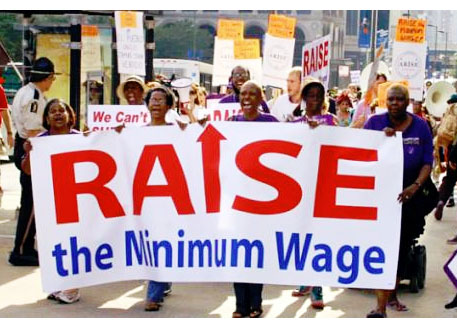 ► In the Washington Post — Minimum wage increases fueling faster wage growth for those at the bottom — The United States’ lowest-paid workers are seeing their paychecks rise at the fastest pace in more than a decade. The Trump White House and Washington policymakers have touted the tight labor market as the main engine driving gains for the working class, but a Washington Post analysis of Labor Department data suggests that paychecks also grew because of a nationwide movement of rising minimum wages in various states and cities over the past couple of years.
► In the Washington Post — Minimum wage increases fueling faster wage growth for those at the bottom — The United States’ lowest-paid workers are seeing their paychecks rise at the fastest pace in more than a decade. The Trump White House and Washington policymakers have touted the tight labor market as the main engine driving gains for the working class, but a Washington Post analysis of Labor Department data suggests that paychecks also grew because of a nationwide movement of rising minimum wages in various states and cities over the past couple of years.
PREVIOUSLY at The Stand — New year brings paid leave, wage increases in Washington — The state minimum wage rose to $13.50 an hour on Jan. 1.
► From the USA Today — Graduate students at Harvard end strike but are still waiting on pay raises, new benefits — Harvard University graduate student workers ended their campuswide strike after 29 days on the picket line, returning to work Jan. 1 even though union leaders and the university have not reached an agreement. Without a new contract, the impact of the strike is unclear.
► In today’s Washington Post — Uber’s secret project to bolster its case against California’s gig-worker law — After California state legislators passed a new law with the intention of transforming Uber drivers and other contractors into employees, executives at the ride-hailing giant sprang into action.
The Stand posts links to Washington state and national news of interest every weekday morning by 10 a.m.





